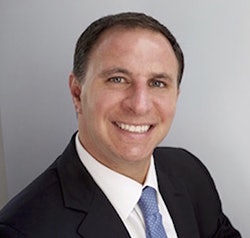
Merida Capital Managing Partner Mitch Baruchowitz has become a vocal observer of the global cannabis market. Whether it’s through Twitter or through his firm’s growing portfolio, Baruchowitz is making his opinions on the rapidly maturing cannabis marketplace known to anyone who’s listening.
Following Merida’s launch of its third fund—seeking to raise $200 million—and two major executive-level hires, Cannabis Business Times took a moment to check in with Baruchowitz on his professional strategies and his thoughts on the current state of corporate growth in cannabis.
I wanted to start with recent hires from Omnicom and Medco Health, executive-level hires, and I want to get your take on what those two types of professional backgrounds mean, in terms of hiring at Merida.
Well, we are an investment fund, but, as I’m sure the word gets out, we're very actively involved in our portfolio companies. To do that hands-on investing and to really provide the stewardship that we think is important to that, part of that is driven by being able to actually give the operating companies the expertise that they need. We are pretty exposed to the coming shift to a much more medically focused industry. Recreational consumer—that's already on a pretty definable trajectory, right? Product innovation, consumer packaged goods. When you look at the medical side, though, it's much more indefinable. The industry grew up under a medical construct. The reality is not very medical, when you think of traditional American Medical Association, journal-driven research, peer-reviewed randomized clinical trials: There's a billion things that happen in the traditional medical world that aren't happening cannabis. And that is not a criticism in any way of the cannabis industry. The reality is medical cannabis is about to yield to cannabis-based medicines. And when you think of those two idiomatic phrases, they are two different things in every way, shape and form—from studs to roof.

We want to be prepared for that. And it's never been our nature to be behind the curve; it’s always our nature to be ahead of the curve. The reality is that a lot of our companies are starting to run into friction as they grow. When you bring a person in, you have to really deconstruct what a person like a Tom Harrison or a Pam Galassini has done in their lives. Tom acquired 45 companies when he was at Omnicom, ran a massive multi-billion-dollar P&L, has health care exposure, ran a health care education company. And Tom immediately goes on to the board of MediaJel, which is a company that we think is doing a fantastic job of strategic marketing and stewardship of cannabis-focused companies. So, Tom immediately gets the access to every resource they might ever need in the marketing and traditional creative world.
And Tom was on the board of Zynerba Pharmaceuticals for four years, which means he's watched at the front edge of the synthetic cannabinoid revolution. So, for Merida, the amount of responsibility that we feel when such incredible people want to work with us—in a lot of ways, it makes us better, because it forces us to act even better, it holds us to a mirror that that we're trying to hold the companies to, as well.
And Pam Galassini, someone who's running a multi-billion-dollar division of a [pharmaceutical distribution] company, is a good person to put on the board or put into an operational role at Manna Molecular, which is trying to innovate delivery technologies that will allow people to use cannabis-based medicines in a more responsible, more definable [way]. You’re talking about creating a real medical vertical. A company like Manna is small, it’s entrepreneurial. It started out by making technology that allowed companies like Papa & Barkley to launch these phenomenal transdermal patches. Unlocking that innovation and entrepreneurship sometimes needs a senior ombudsman, who's seen it happen in other places and can say, "The problems you’re encountering are not unique to cannabis, and I can help you navigate them."
When you talk about cannabis-based medicines—these medical verticals, the innovation, and where the medical side of the industry is headed—is the market driving that? Or do you see things like the FDA playing a role and pushing companies in that direction? Or is this just straight, private innovation?
I would say that you want to be proactive with both high-level and idiosyncratic regulatory risk. If you're investing in cannabis, that's part of the game. You internalize that risk as part of your normal process. You don't want to build a company, and then all of a sudden, the rules change, and you go, ‘Wow, we didn't think about the FDA.’ We’re being proactive in making sure that the companies that we invest in are shaped in a manner that—you don't need to know the answers yet, but you should at least have a thought process in which regulatory risk and regulatory friction and other friction is internalized. That’s why you bring senior-level people like a Danny Moses into our investment committee.
The best investors I've ever observed seem to anticipate risk, but they're anticipating it based on both definable and the indefinable. The indefinable comes by bringing people who have seen enough evolution in their own respective industries so that they can say, you know, here's something that you might see when you're dealing with the FDA. Someone like Pam, a medical person, obviously lives in the FDA world. Pam's FDA experience is more about Merida’s internal [strategy]. Manna itself may not run into the FDA for years, but Merida, as an investor, is looking for opportunities that may be asymmetrically disposed, based on what the FDA may do in the future. That's a mindset we have, which is the voracious consumption of information and data. And not just random information and data, but information and data that is actionable to the opportunities we're pursuing.
In a lot of materials that that Merida has published, the word “ecosystem” is used. With respect to that ecosystem and the portfolio you've assembled, what's an example of one corner of the industry affecting another? And how do you take a long view on what is a pretty volatile ecosystem at times?
I just got a text from a CEO of a really interesting company, who's watching us go through our diligence process, and he's like, “Wow, you guys really do have the opposite of FOMO.” We look at each company in the context of our portfolio and how those companies can work together. As one example, look at the data side: New Frontier gets access to MJ Freeway’s anonymized data, which is part of that MJ Freeway/New Frontier consumer report. Then you start to get some consumer data, which allows consumer-packaged-goods companies to zero in on potentially underserved parts of the industry. You don't want to necessarily just look to fill gaps, you’re looking for information and data from one side of our portfolio to inform the manner in which we think through other sides.
Each state has a closed loop. We use our ecosystem as a global feedback engine. I think the data side is starting to help the on-the-ground operational side in a way that wasn't really happening in the last two years. Digital adoption in general is so fragmented that you're just starting to see companies mature to a point where they're looking for those tools to give them that real-time feedback on their own performance and on the performance of their products.
How do you, personally and as an institution, zoom out and look at the big picture?
It's very easy to go to conferences—and I run into some companies that do this all the time, where all they're hearing are all these wonderful things and all the feedback is great. And then they get to Merida, and we start asking tough questions. And they’re like, “What is this? Why are you doing this to us? Why are you on my back?” It's very easy to just listen to the crosswinds of, “It's all wonderful.” You forget for a second that tough questions and respectful disagreement is how you actually get better. Listening to people who have seen other things.
What I'm passionate about is really building companies that are structurally prepared for whatever comes next. And, again, it's more about creating a mindset in those companies than it is about like, this specific fact is going to lead you to the promised land. It’s creating an engine where good executives have a strong information loop where they can get the right feedback they need to adjust and calibrate to changing information every day. I zoom out by allowing my team to really dig in and by empowering them to get granular on companies. And sometimes I’m granular and sometimes I step back, and then we have an investment committee meeting where we're at a 30,000-foot level. I'm trying to live by my own mantra with respect to the investments we make as well.
To sort of flip the script a little bit, I was wondering if you might have either a particular lesson you've learned or even a perceived failure that that turned out to set you up for success later on?
Merida was formed out of disaster, basically. I was an applicant in the Maryland licensing process after having had some success on that front. The Maryland one we really put our heart into. I spent a tremendous amount of time on the ground there developing everything you'd want locally, and it was a two-year process, $2.5 million, and we lost. I started to believe that it maybe my skills at building companies would be better used in companies that didn't need licensing as a gating factor. I was building something that could be vaporized overnight.
This was the first time where we put this much effort into a licensing process. We really felt strongly about what we were doing; we’d already won three licenses in three of the hardest-to-win states, and maybe that can also make you a little blind to the risk of this. We'd already been buying equipment in the other states and looking at data, so the concept that the supply chain was starting to mature seemed a lot more attractive after a licensing loss like that. It was just so humbling.
I'm a pretty happy-go-lucky person. And I can tell you, I think that I might have it taken me until noon to go to bed the next day, because we found out at like 5 o'clock at night. I've never felt worse about anything [in] my entire life, professionally, ever. And I'd already been thinking about this fund, and doing more supply chain-focused investments, less tethered to licensing. That loss informs the way we think about everything we do. Merida was launched five days later.
There's nothing worse, to be honest, than saying to people, “I know that I've been raising money and bringing opportunities in direct licensing to you. I want you to trust a black box. I don't know what I'm going to invest in yet. But I want you to give me money to invest in those things.” In those discussions with some really sophisticated folks, not only was I able to pick myself up off the mat, but I also started to understand some of the elements of how this could be built, how Merida could be built in a smart way and what the investment thesis should be to engage the sophisticated people who were relying on me to be their exposure to the space. I think Merida is the success of a network of people who care. It's really not a story about Mitch Baruchowitz in any way, shape or form. I really mean that. I think in a lot of ways, I've just been lucky to have incredible people around me. We’ve always had an open dialogue, and that open dialogue has allowed me to make decisions, which a lot of people deserve credit for.
You guys have launched a third fund. And it's a big one. Looking ahead, what are some of the things that you're hoping to learn about the industry and about where Merida is going—and also what you're hoping to see your team accomplish?
Well, I do think there's a more capital-intensive need when you're preparing companies who are focused on formulation and more technology-driven or scientifically-driven opportunities. As you get to more of a quality control approach and quality assurance on the consumer packaged goods or adult-use side, you start to think about bigger equipment needs. So, you need a bigger fund if you're going to make bigger investments in more capital intensity. It's very hard to get a company excited about a $500,000 check if they need to spend $26 million.
As the industry shifts, the chest size needs to be bigger. We're not traditional private equity. We have not raised $200 million yet; we're in the process of raising that money. Look, we've already raised a fair amount very quickly, but we're raising and spending at the same time, basically. No one should have the impression that Merida’s got a 90-mile wind in our multi-masted cutter, that's trying to make the run from London to Hong Kong in less than 61 days—to use an analogy.
When you're looking at technological innovation, it gets expensive to build things. And we want to be in a position to write larger checks, we want to be in a position to take larger positions in companies that we really believe in.
We’ve built enough muscle memory, enough information, enough data where we can make more concentrated investments with that high conviction. That's why you need to raise a bigger fund, but it's a challenge; money doesn't fall from the sky. You have to work at it. And at the end of the day, we're really focused on the work. So, you know, the glad-handing, the victory laughing is not much of a Merida thing. We’re not built that way. We feel like we're so nose-to-the-ground that the best is yet to come.
You know, I think we've done a good job until today. But I think the best of what we're capable of—the team that we have, the guys from Wharton, the guys from Goldman Sachs, all this expertise—is now really in a place where we have a little bit more scale, where we can do things. Instead of having to find the answer, the answers are kind of there now. Look, do you think a guy like Tom Harrison lends his name to a company like Merida lightly? I mean, it makes me want to cry. Honestly, I get teary-eyed. While I think I have the experience in my life to build Merida correctly, it feels like it's moving so quickly. You need to take stock almost every day of making sure you're doing the right things, because there are a lot of people who are relying on us. It's not just companies now—it’s employees. Our collective portfolio has some 2,900 employees now, and it’s going to generate almost $500 million of collective revenues. We're part of a very important ecosystem. And we owe that ecosystem as much as it owes us.



























